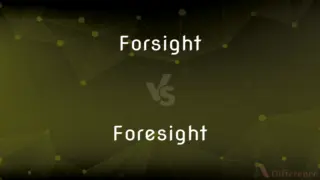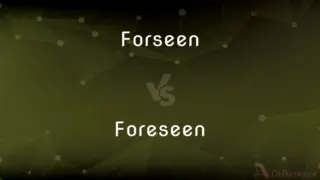Biassed vs. Biased — Which is Correct Spelling?
Edited by Tayyaba Rehman — By Fiza Rafique — Updated on March 19, 2024
"Biassed" is an incorrect spelling; the correct spelling is "Biased." "Biased" describes showing an unjust favoritism or prejudice.

Table of Contents
Which is correct: Biassed or Biased
How to spell Biased?

Biassed
Incorrect Spelling

Biased
Correct Spelling
ADVERTISEMENT
Key Differences
Recall that "biased" has the same number of letters as "tilted," both indicating a slant.
Think of "bias-ed," emphasizing the singular 's'.
The word "biased" has an "i" and an "e" but only one "s."
Remember, "bi" means two; don’t double the "s" too.
American English often favors shorter forms, so "biased" fits the trend.
ADVERTISEMENT
How Do You Spell Biased Correctly?
Incorrect: Her judgement was biassed by her personal feelings.
Correct: Her judgement was biased by her personal feelings.
Incorrect: The article was quite biassed and didn't present all sides.
Correct: The article was quite biased and didn't present all sides.
Incorrect: It's important to avoid biassed opinions in scientific research.
Correct: It's important to avoid biased opinions in scientific research.
Incorrect: The review was biassed and unfairly favored one product.
Correct: The review was biased and unfairly favored one product.
Incorrect: He seemed rather biassed in his views.
Correct: He seemed rather biased in his views.
Biased Definitions
Showing an unfair preference for or against someone or something.
The survey was biased towards younger participants.
Prejudiced in favor or against a thing, person, or group.
The teacher was biased against left-handed students.
Having a particular inclination or perspective.
He has a biased opinion on the matter.
Not neutral; slanted.
Biased news coverage can misinform the public.
Having an unbalanced viewpoint.
The documentary was clearly biased, lacking a fair representation.
Marked by or exhibiting bias; prejudiced
Gave a biased account of the trial.
Exhibiting bias; prejudiced.
The newspaper gave a biased account of the incident.
Angled at a slant.
The table had a biased edge.
(electrical engineering) On which an electrical bias is applied.
(statistics) Exhibiting a systematic distortion of results due to a factor not allowed for in its derivation; skewed.
Simple past tense and past participle of bias
She biased them against him for no apparent reason.
Favoring one person or side over another;
A biased account of the trial
A decision that was partial to the defendant
Excessively devoted to one faction
Biased Meaning in a Sentence
To ensure fairness, we must recognize and correct our biased perspectives.
Avoiding biased language in writing promotes inclusivity and respect.
The jury's decision should not be biased by external influences.
The teacher's feedback was unbiased, focusing purely on the quality of work.
Biased algorithms in technology can perpetuate inequalities.
She was aware that her experiences might have biased her opinion.
A biased media can significantly influence public opinion.
The selection process was criticized for being biased against certain groups.
The biased report ignored significant evidence to the contrary.
She criticized the biased portrayal of history in the textbook.
The biased article sparked a lot of controversies.
Educators are trained to recognize and address their own biased attitudes.
Biased opinions can hinder progress in discussions on important issues.
Fact-checking is essential in identifying and correcting biased news stories.
Recognizing one's own biased beliefs is the first step towards changing them.
Researchers strive to eliminate biased sampling from their studies.
His biased view on the matter made it difficult to convince him otherwise.
Companies are implementing measures to reduce biased hiring practices.
The debate was an opportunity to challenge biased assumptions.
Biased coverage of events can lead to a misinformed public.
Parents try to be unbiased, but sometimes they show a biased preference.
His argument was strong, but his conclusions were clearly biased.
Implementing blind auditions helped reduce biased selections in orchestras.
To combat biased information, always check multiple sources.
The film was criticized for its biased depiction of historical events.
Common Curiosities
What is the verb form of Biased?
The verb form is "bias."
Which vowel is used before Biased?
The vowel "i" is used before the 'a' in "biased."
Why is it called Biased?
The term "biased" originates from "bias," indicating a slant or inclination, suggesting prejudice or favoritism.
What is the singular form of Biased?
Biased is an adjective, so it doesn't have a singular or plural form. However, "bias" is the singular noun form.
Which conjunction is used with Biased?
There isn't a specific conjunction that's used with "biased." It depends on the context.
Which preposition is used with Biased?
Common prepositions with "biased" include "towards," "against," and "in favor of."
What is the pronunciation of Biased?
Biased is pronounced as /ˈbaɪ.əst/.
What is the plural form of Biased?
Adjectives don’t have plural forms in English, so "biased" remains the same.
What is the root word of Biased?
The root word is "bias."
Is Biased a collective noun?
No, biased is an adjective.
Is the Biased term a metaphor?
No, biased is not a metaphor, but it can be used in metaphorical expressions.
Is Biased a noun or adjective?
Biased is an adjective.
Is Biased an abstract noun?
No, biased is an adjective. The related noun "bias" can be considered abstract.
Is the word Biased imperative?
No, biased is an adjective, not a verb.
What is the opposite of Biased?
The opposite of "biased" is "unbiased" or "impartial."
Which article is used with Biased?
Either "a" or "the" can be used before a noun that follows "biased," depending on the context.
Is the word Biased a gerund?
No, biased is an adjective.
How many syllables are in Biased?
Biased has two syllables.
How do we divide Biased into syllables?
Biased is divided as bi-ased.
Which determiner is used with Biased?
Determiners like "the" or "a" can be used with nouns that follow "biased," depending on the context.
Is Biased an adverb?
No, "biasedly" can be an adverbial form, but it's rarely used.
Is Biased a negative or positive word?
Typically, "biased" has a negative connotation, implying unfairness or prejudice.
What is a stressed syllable in Biased?
The first syllable, "bi," is stressed in "biased."
What part of speech is Biased?
Biased is an adjective.
Is Biased a vowel or consonant?
The word "biased" starts with a consonant.
Is Biased a countable noun?
Biased is not a noun, so it's not countable.
Is the word “Biased” a Direct object or an Indirect object?
Biased is an adjective and does not function as an object.
What is the first form of Biased?
As an adjective, biased doesn’t have verb forms. But the verb "bias" is its base form.
What is the second form of Biased?
The verb "bias" doesn't typically have a distinct second form. The past form can also be "biased."
What is the third form of Biased?
For the verb "bias," the third form or past participle is "biased."
How is Biased used in a sentence?
Biased is used to describe someone or something showing an unfair preference, e.g., "The report was clearly biased in its conclusions."
What is another term for Biased?
Another term for biased is "prejudiced."
Share Your Discovery

Previous Comparison
Setted vs. Set
Next Comparison
Meating vs. MeetingAuthor Spotlight
Written by
Fiza RafiqueFiza Rafique is a skilled content writer at AskDifference.com, where she meticulously refines and enhances written pieces. Drawing from her vast editorial expertise, Fiza ensures clarity, accuracy, and precision in every article. Passionate about language, she continually seeks to elevate the quality of content for readers worldwide.
Edited by
Tayyaba RehmanTayyaba Rehman is a distinguished writer, currently serving as a primary contributor to askdifference.com. As a researcher in semantics and etymology, Tayyaba's passion for the complexity of languages and their distinctions has found a perfect home on the platform. Tayyaba delves into the intricacies of language, distinguishing between commonly confused words and phrases, thereby providing clarity for readers worldwide.








































